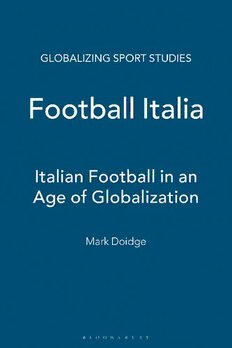
Football Italia: Italian Football in an Age of Globalization PDF
257 Pages·2015·3.457 MB·English
Most books are stored in the elastic cloud where traffic is expensive. For this reason, we have a limit on daily download.
Preview Football Italia: Italian Football in an Age of Globalization
Description:
Football has undergone a period of transformation over the last thirty years. Despite these global processes, different national leagues have adapted in different ways. After an initial period of success directly after Italia ’90, Italian football has gone through a period of sustained crisis. It has been blighted by financial mismanagement, corruption scandals and fan violence. This has impacted Italy’s ability to compete on a global stage.Football Italia accounts for the development of Italian football in relation to the wider global transformations impacting football and addresses the reasons for Serie A’s initial success and current malaise. Theoretically, this book locates Italian football within the wider power network of the state and how this has impacted political engagement. After an historical overview of the Italian political economy, Football Italia highlights how football is part of the wider political network. Football clubs are owned by powerful businessmen (and they are all men) who are also politicians. This centralisation of power within a small hegemonic group inhibits change. Within this broader structure, wider corruption scandals continue; from regular match-fixing scandals to doping. Meanwhile, stadiums are crumbling and police over-aggressive. It is within this context that we must place the fans. Both the ultras and supporters who attend official supporters’ clubs are disaffected and without the power to change the status quo. Consequently, Italian football has been in decline throughout the 21st century.
See more
The list of books you might like
Most books are stored in the elastic cloud where traffic is expensive. For this reason, we have a limit on daily download.
